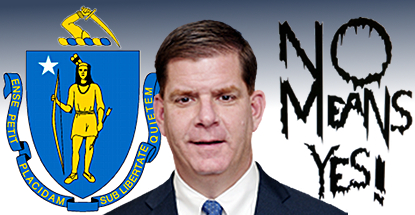
UPDATED WITH WYNN OFFER TO BOSTON AT BOTTOM OF PAGE.
Massachusetts has revealed the specific wording of the casino repeal question that will appear on this November’s ballot, but concerns are already mounting that voters may not understand what they’re voting for.
Last month, the state’s Supreme Judicial Court ruled that voters would have a chance to repeal the 2011 law that authorizes the development of three casinos and one slot parlor. The ballot question asks whether voters approve of the 2011 law, which it then proceeds to summarize, before asking voters to weigh in with a ‘yes’ or ‘no’ vote.
However, the ballot language cautions that “A YES VOTE would prohibit casinos, any gaming establishment with slot machines and wagering on simulcast greyhound races” while “A NO VOTE would make no change in the current laws regarding gaming.” In other words, voting ‘yes’ is a ‘no’ vote for expanded gaming and vice versa. No confusion there, we’re sure.
To date, only the slot parlor is actually under construction in Plainville by Penn National Gaming. The casino license for the western part of the state has been provisionally awarded to MGM Resorts while Wynn Resorts and Mohegan Sun are still battling over the Boston-area license.
BEANTOWN BUSTUP BETWEEN WALSH AND WYNN
Meanwhile, the mayor of Boston is making more headlines via his refusal to continue talks with Wynn regarding financial compensation if Wynn were to win the area’s lone casino license. Last week, Mayor Martin Walsh brokered a deal in which the city would receive around $18m annually if the Mohegans were to open their $1.3b casino in Revere, just outside Boston. This ‘surrounding community’ agreement would extend for 15 years, putting just under $300m into Boston’s coffers. The Mohegans have already reached a $25m/year ‘host community’ agreement with Revere officials.
Boston was supposed to arrive at a similar ‘surrounding community’ deal with Wynn but Walsh has refused to participate in arbitration talks, telling the Boston Herald that Wynn “really hasn’t stepped up to the table, thinking that Boston isn’t worthy of a real good agreement.” Wynn has rejected Walsh’s barbs, saying the Massachusetts Gaming Commission (MGC) “has a process established for reaching agreements and we’ll follow it.”
On Tuesday, the MGC reluctantly agreed to decide the compensation question itself, although a decision isn’t expected for weeks. Walsh is playing a dangerous game, as there is a remote possibility that the MGC could rule that the city’s refusal to engage in arbitration meant it had waived its right to claim ‘surrounding community’ status, leaving it with nothing if Wynn’s $1.6b casino plan in Everett were to win the license. Then again, maybe this is all a big misunderstanding. By Massachusetts standards, wouldn’t Walsh’s ‘no’ to arbitration really mean ‘yes?’
UPDATE: Late Friday, the MGC released details on Wynn’s offer to Boston: $1m upfront and $2.6m annually. Wynn spokesman Michael Weaver called the offer “almost three times the value of our largest existing surrounding community agreement.” Wynn has previously stated it would spend $5m on road improvements in the Boston area and would use “good faith efforts” to ensure it spent at least $15m annually buying goods and services from Boston businesses.
Walsh has yet to opine on Wynn’s offer, but Mohegan Sun CEO Mitchell Etess was quick to point out that his group had approached its own negotiations with surrounding communities “with a true spirit of cooperation. Today, it is clear that Steve Wynn has not.”
